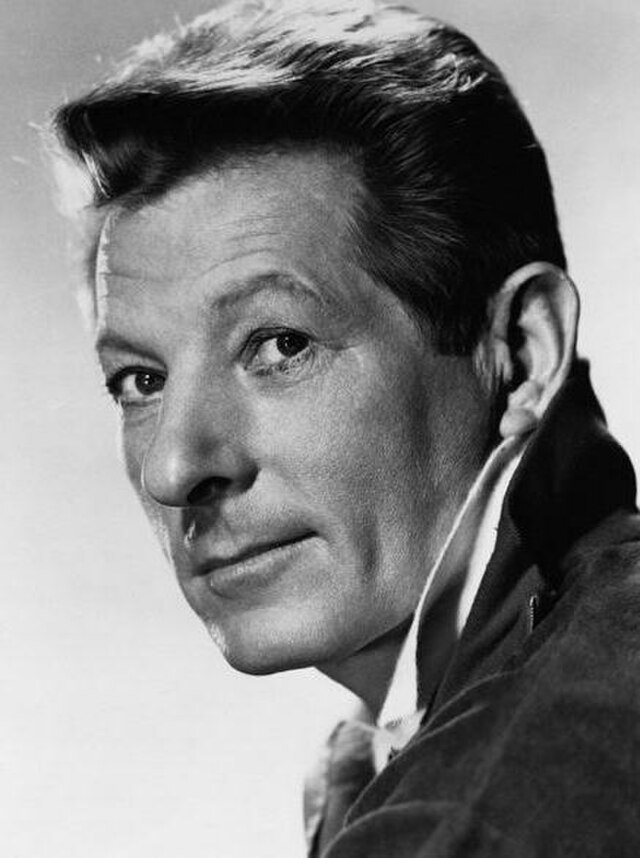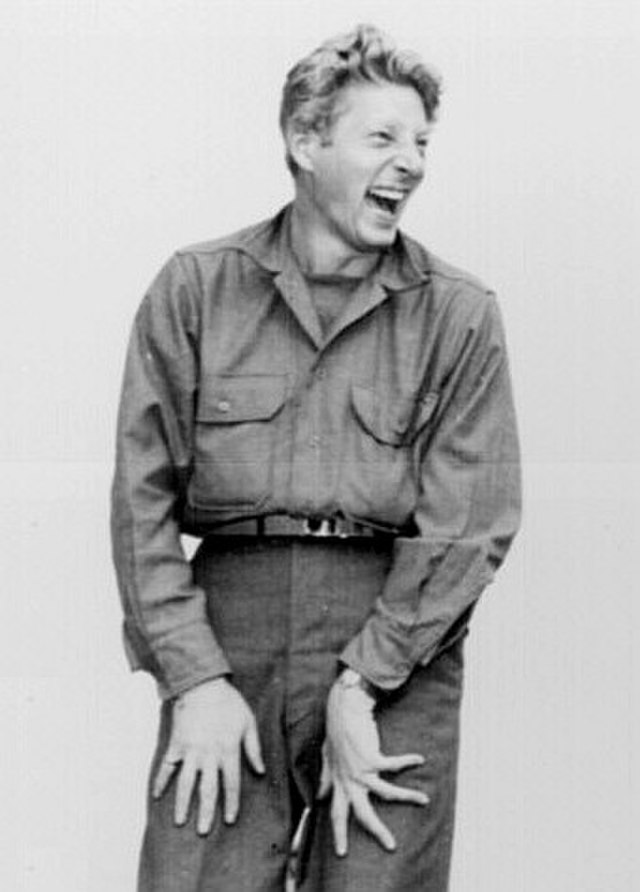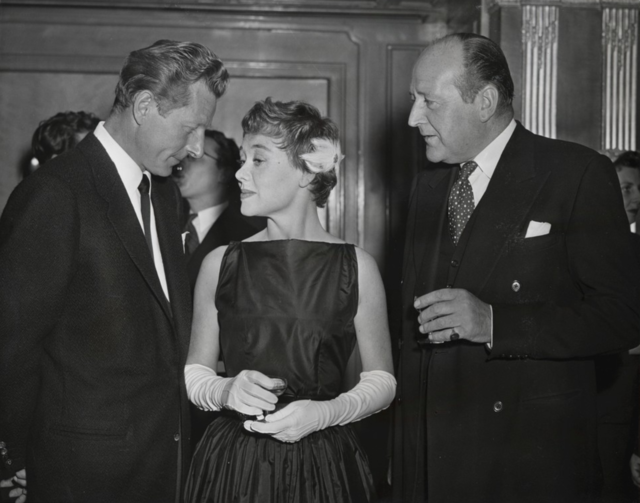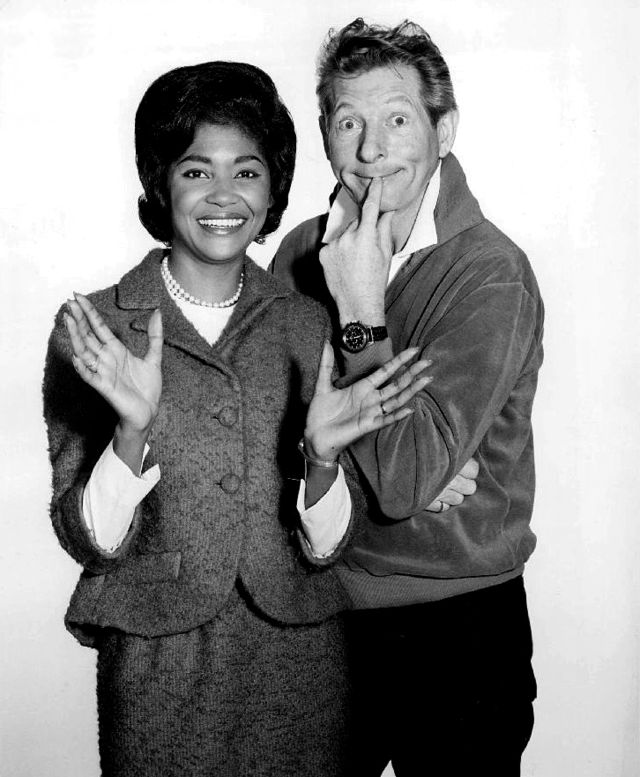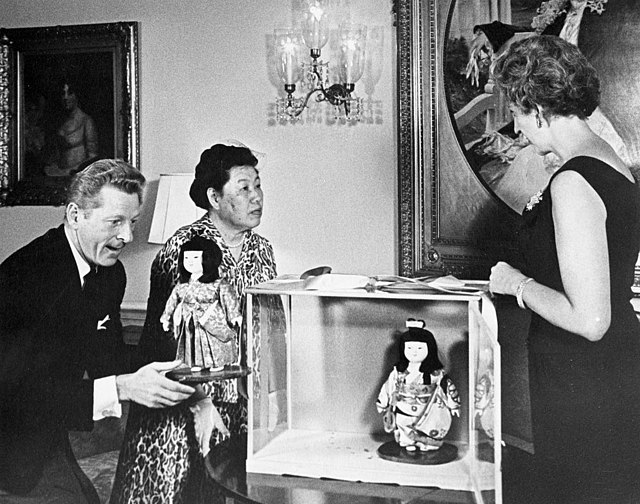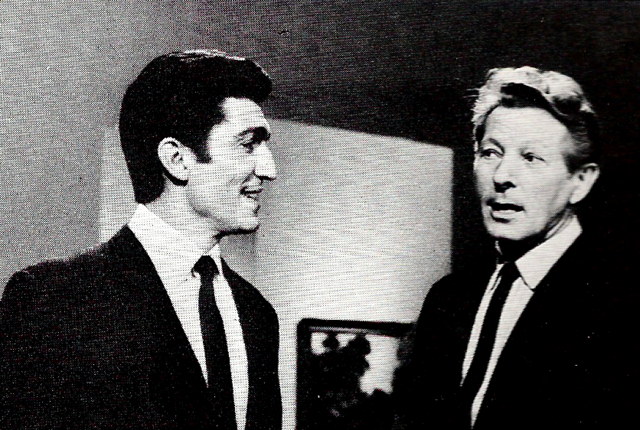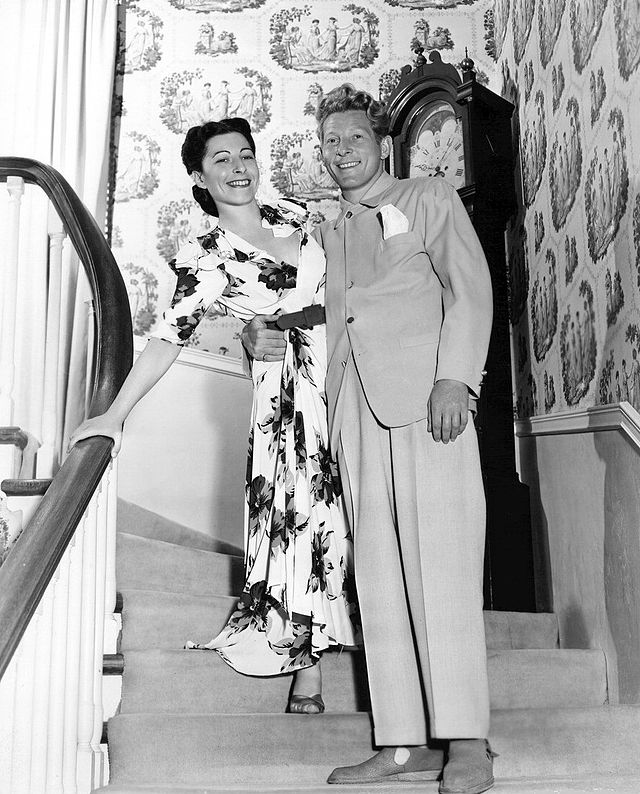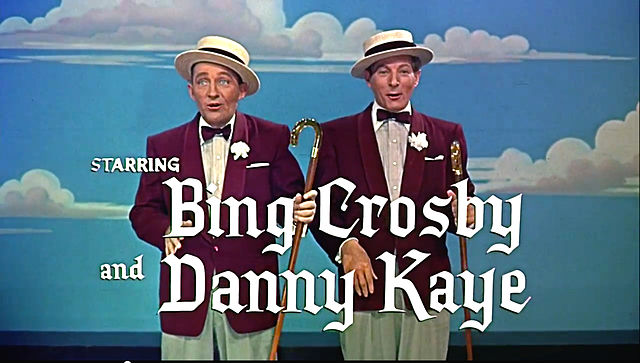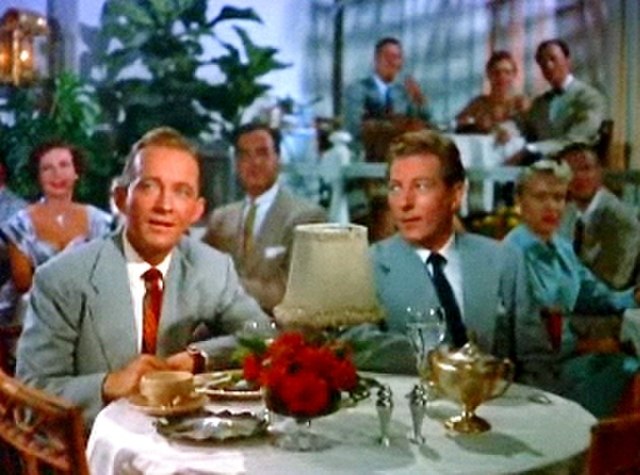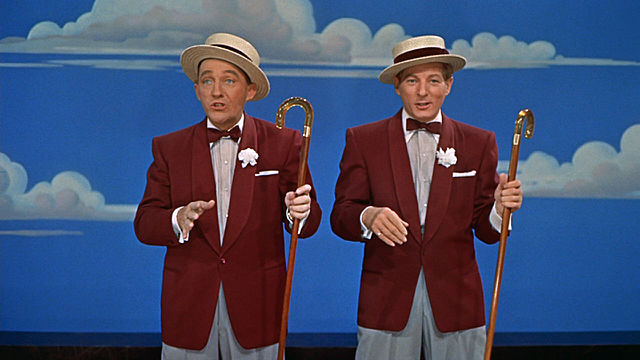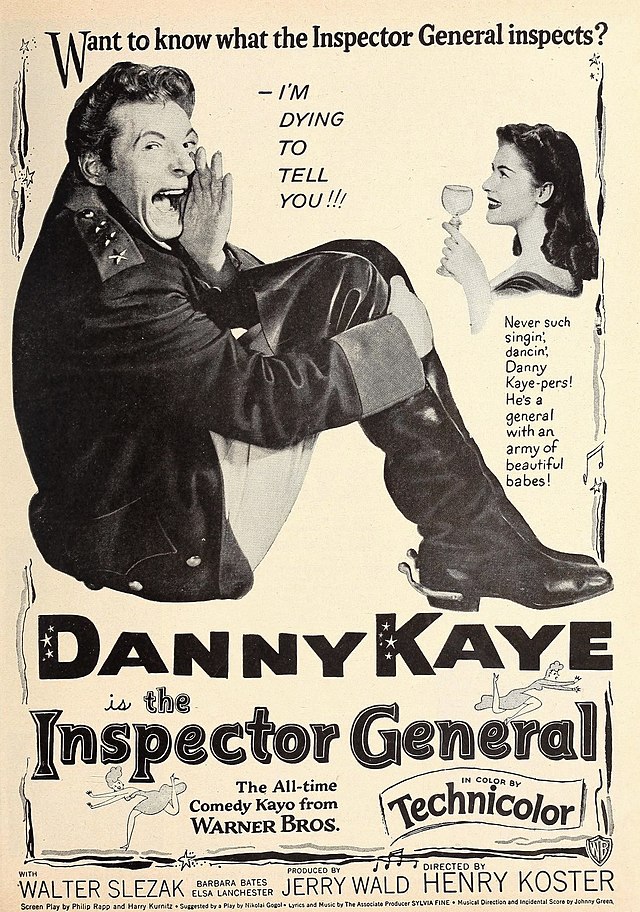Danny Kaye
back| Full Name | David Daniel Kaminsky |
| Stage Name | Danny Kaye |
| Born | January 18, 1911 |
| Birthplace | Brooklyn, New York, USA |
| Died | March 3, 1987 |
| Buried | Kensico Cemetery, Valhalla, New York, USA |
| Married to | Sylvia Fine (married in 1940, remained together until his death) |
| Children | One daughter, Dena Kaye |
| Notable films | The Secret Life of Walter Mitty (1947) - The Court Jester (1955) - Hans Christian Andersen (1952) - White Christmas (1954) - The Inspector General (1949) |
Danny Kaye
The Entertainer Extraordinaire
Danny Kaye was a multi-talented American actor, comedian, singer, and humanitarian. Raised in Brooklyn, he found early success in vaudeville before becoming a Hollywood star in the 1940s.
Known for his rapid-fire patter, physical comedy, and musical versatility, Kaye captivated audiences in films like The Secret Life of Walter Mitty (1947), Hans Christian Andersen (1952), and White Christmas (1954).
Beyond entertainment, Kaye was a dedicated UNICEF ambassador, traveling the world to advocate for children's welfare.
Related
Danny Kaye (1911 – 1987)
Biography and Movie Career
Danny Kaye, born David Daniel Kaminsky on January 18, 1911, in Brooklyn, New York, was one of the most beloved entertainers of the 20th century. Known for his unique blend of physical comedy, linguistic dexterity, and musical talent, he became an international movie star, a humanitarian, and a symbol of joy and laughter for millions.
Early Life and Family Background
Danny Kaye was the youngest of three sons born to Ukrainian-Jewish immigrants, Jacob and Clara Kaminsky. His father was a tailor who had immigrated to the United States seeking a better life. Growing up in the culturally rich but financially poor neighborhood of Brooklyn, Danny's natural charm and knack for storytelling emerged at a young age. Despite a difficult childhood, including the loss of his mother when he was in his teens, Kaye developed a comedic and musical flair that would serve him throughout his life.
He attended Thomas Jefferson High School but dropped out before graduating. He worked a variety of jobs, including as an office boy, soda jerk, and insurance salesman. His restless energy, however, constantly pulled him toward performing.
Path to Stardom
Kaye’s career began somewhat accidentally when he joined a traveling vaudeville troupe. In the mid-1930s, he spent time performing in the Borscht Belt, a collection of resorts in New York's Catskill Mountains, known for developing Jewish-American comedians and entertainers. His big break came when he was noticed by musical theater composers who helped him land a role in the 1939 musical revue The Straw Hat Revue.
It was during this time that Kaye met Sylvia Fine, a talented songwriter and lyricist who would become his wife in 1940. Fine was instrumental in shaping Kaye's career, creating many of the comedic songs that highlighted his talents. Their partnership was both personal and professional, as Fine worked as Kaye's musical director, crafting routines that showcased his talents for fast-paced patter, tongue-twisting songs, and whimsical characters.
Rise to Film Stardom
In the early 1940s, Danny Kaye made his film debut, and his breakthrough performance came in Up in Arms (1944), where his fast-talking, high-energy comedic style immediately captivated audiences. The success of this film led to a string of major roles in the 1940s and 1950s, cementing him as a star.
Among his most famous films are:
- The Secret Life of Walter Mitty (1947): Based on James Thurber’s short story, Kaye portrayed the title character, a daydreamer who imagines himself in fantastical situations.
- Hans Christian Andersen (1952): A fictionalized musical biography where Kaye brought to life the famous Danish storyteller, capturing the hearts of audiences.
- White Christmas (1954): Starring alongside Bing Crosby, Kaye was part of one of the most beloved holiday films ever made.
- The Court Jester (1955): Considered one of his finest performances, this film blended musical comedy and swashbuckling adventure, and showcased his famous "vessel with the pestle" tongue twister.
- The Inspector General (1949): A period comedy where Kaye's role as an illiterate fool mistaken for a powerful inspector allowed him to demonstrate his gift for slapstick humor.
Though Kaye was at the height of his film career during these decades, he continued to perform on stage and television, including a successful variety show, The Danny Kaye Show, which aired from 1963 to 1967.
Personal Life and Passions
Danny Kaye's marriage to Sylvia Fine was long-lasting, although it was not without challenges. Kaye was known to have had various rumored affairs, including with actress Eve Arden and French star Michèle Morgan, though he and Fine remained married throughout his life. Together, they had one daughter, Dena Kaye, who later became a writer and journalist.
Beyond his work in film and theater, Kaye had numerous passions. He was an avid pilot and even flew missions for the Civil Air Patrol during World War II. He was also a skilled cook, known for his extravagant meals, and even once served as a guest conductor for symphonies, despite having no formal musical training. His natural charisma made him an engaging conductor, and he was regularly invited to lead orchestras for charity events.
Perhaps most importantly, Danny Kaye was deeply committed to humanitarian work. His involvement with UNICEF began in the 1950s, and he became one of the organization’s most visible and effective goodwill ambassadors. His efforts took him around the world, raising funds and awareness for children's health and welfare, which earned him several international honors, including a special Academy Award in 1955 for his work with the organization.
Later Years and Death
Kaye's film career slowed in the 1960s, as he shifted focus toward television, stage performances, and charity work. By the 1970s, he had largely retired from acting, though he continued to make occasional appearances on television and in live performances.
Despite his cheerful public persona, Kaye had bouts of depression and struggled with health issues later in life. In the early 1980s, he underwent quadruple bypass heart surgery. He also suffered from arthritis and other ailments that increasingly limited his physical activity.
Danny Kaye died on March 3, 1987, at the age of 76. The cause of death was heart failure, stemming from complications of hepatitis C, which he had contracted from a blood transfusion during his earlier heart surgery. His death marked the end of an era for Hollywood, as Kaye was one of the last great stars from the golden age of film.
He was buried in Kensico Cemetery in Valhalla, New York, beside his wife Sylvia Fine, who passed away in 1991.
Legacy
Danny Kaye’s legacy is one of joy, generosity, and talent. He was a performer who could make people laugh while inspiring them to care about the world around them. His contributions to comedy, film, and humanitarian causes continue to resonate, making him a beloved figure long after his passing. Whether it was through his fast-talking comedic routines or his heartfelt work with UNICEF, Kaye’s gift was his ability to connect with people and bring them happiness—a gift that continues to endure.
Danny Kaye Boxing Scene
Vibrant Acting Style of Danny Kaye
Danny Kaye's acting style was unique, vibrant, and often described as a brilliant fusion of comedy, musicality, and physicality. He stood out among his peers in Hollywood due to his ability to combine fast-talking wit, physical slapstick, and a musical versatility that allowed him to sing, dance, and deliver comedic monologues with equal skill. His approach to acting was deeply tied to his natural charisma, his sense of playfulness, and his incredible energy, all of which he poured into every performance.
Physical Comedy and Slapstick
At the core of Danny Kaye's acting style was his gift for physical comedy. He had a rubbery, elastic quality to his movements that allowed him to create exaggerated gestures, pratfalls, and facial expressions that conveyed humor without needing dialogue. His body was a tool for storytelling, and he often used it to convey everything from confusion to joy to absurdity. In films like The Court Jester and The Inspector General, Kaye’s physicality was the centerpiece of his comedic persona, where he would dash across sets, trip over props, or break into an impromptu dance in the middle of a scene.
Kaye’s comedic timing was impeccable, and he knew exactly how to use pauses, reactions, and awkward silences to heighten the effect of a physical gag. His scenes often had a balletic quality to them, where he moved through space with grace, even when it seemed like he was bumbling or tripping over himself.
Fast-Talking Verbal Humor
One of Kaye's signature skills was his ability to deliver rapid-fire, tongue-twisting dialogue. His famous patter songs and comedic monologues were delivered at a breakneck pace, leaving audiences marveling at his verbal dexterity. Songs like Tschaikowsky (and Other Russians) from the Broadway show Lady in the Dark and the The Pellet with the Poison routine in The Court Jester are perfect examples of how he could manipulate language for comic effect. His delivery was fast but clear, and he would often switch between various accents, gibberish, and nonsensical sounds to keep the rhythm of a joke going.
Kaye had an ability to create linguistic acrobatics out of dialogue, where the wordplay and nonsensical sounds added layers to the comedy. This style drew inspiration from vaudeville, a medium where performers relied heavily on quick-witted, verbal humor, and Kaye modernized it for film. In The Secret Life of Walter Mitty and Knock on Wood, this quick-paced, verbal comedy became one of his trademarks.
Musicality and Song
Unlike many comedians of his era, Danny Kaye had a natural musical talent that became an integral part of his performances. His voice was versatile, allowing him to sing sweet ballads one moment and perform hilarious patter songs the next. His ability to blend music and comedy was a key part of his appeal. Kaye could move effortlessly from singing a heartfelt song, like Inchworm from Hans Christian Andersen, to performing a comic number like Thumbelina with exaggerated expressions and playful silliness.
Kaye’s musical performances were not simply about singing; he used songs as a vehicle for humor. He would infuse songs with comedic elements, often speeding them up, altering his voice, or incorporating bizarre sounds and made-up words. His timing and rhythm were impeccable, turning even simple melodies into showcases for his comedic genius.
Innocence and Naïveté
A hallmark of Kaye’s acting style was the innocence and naïveté he brought to many of his characters. He often portrayed wide-eyed, well-meaning men who found themselves in extraordinary or absurd situations. In films like The Inspector General, The Secret Life of Walter Mitty, and The Kid from Brooklyn, Kaye’s characters are often dreamers, bumblers, or accidental heroes who win the audience’s affection through their good intentions and childlike wonder.
His comedic persona was often built around this notion of the “everyman” thrust into chaotic circumstances, and his earnestness allowed him to ground even the most ridiculous situations in something human and relatable. This quality was what made him so endearing to audiences—no matter how silly or exaggerated his characters were, they always had a core of innocence that made them likable and sympathetic.
Energy and Versatility
Danny Kaye was known for his boundless energy, which seemed to power every aspect of his performances. Whether he was delivering rapid-fire dialogue, bouncing around the set in a choreographed dance, or performing an intricate musical number, his energy never faltered. He was a tireless performer who could easily shift between various modes—comedy, song, slapstick, and even moments of emotional depth.
His versatility was one of his greatest strengths. Few actors of his time could move between genres with the ease that Kaye did. He could star in a zany comedy like The Court Jester one moment, a touching musical like Hans Christian Andersen the next, and then showcase a more serious, reflective side in films like Me and the Colonel. This versatility kept him fresh and relevant across decades, and it made his body of work incredibly varied.
Charm and Engagement with the Audience
Kaye’s on-screen charm was undeniable. Even in films where he played awkward or clumsy characters, he maintained an engagement with the audience that felt personal. His big, expressive eyes and wide smile were part of what made him so charismatic. He had the rare ability to connect with viewers through the screen, drawing them into his world and making them feel as though they were in on the joke.
This charm extended beyond his films to his live performances and television work, where he interacted directly with audiences. His warmth, combined with his comedic genius, made him an entertainer who was universally loved and admired.
Overall Impact
Danny Kaye’s acting style was revolutionary for its time because it was multifaceted. He blended physical comedy, musical theater, and rapid-fire wit in a way that few actors could. His performances were kinetic, energetic, and constantly evolving, making him a dynamic presence in any role he took on. His ability to evoke laughter, joy, and even a sense of wonder was a testament to his skill as an actor and entertainer. At the heart of his style was his playful and joyful spirit, which left a lasting impact on the world of film and comedy.
Quotes from Danny Kaye
On Life and Humor:
- "Life is a great big canvas, and you should throw all the paint you can on it."
This quote captures Kaye's zest for life and his belief in living fully and creatively.
- "I wasn't born a fool. It took work to get this way."
A humorous reflection on his comedic persona, highlighting the effort and skill behind his seemingly effortless humor.
- "I have a theory that the only original things we ever do are mistakes."
Kaye's take on creativity and the unexpected moments in life, showing his embrace of imperfection as part of the creative process.
On Performing:
- "An entertainer should in his public performance keep himself out of any controversy or partisanship. His role is to amuse, interest, and inspire."
This reflects Kaye's belief in the power of entertainment to uplift and unite people, without becoming embroiled in divisive issues.
- "I became an entertainer not because I wanted to but because I was meant to."
Kaye often spoke of his career as something that was a natural part of who he was, driven by his innate talents and passion for performance.
- "To play a role is to inhabit another person's skin, to play that role is to understand and love that character, whether hero or villain."
A reflection on his approach to acting and the empathy he brought to all his roles, both comedic and serious.
On Humanitarian Work:
- "It’s not enough to just survive. It’s not enough to muddle through life. You’ve got to live."
This sentiment aligns with Kaye’s dedication to making a positive impact on the world, particularly through his work with UNICEF.
- "I'm just an entertainer, but in a time of need, an entertainer can be a powerful person."
Kaye recognized the influence he could have as a performer, particularly in drawing attention to important causes like his work for children with UNICEF.
- "I feel like I’m the luckiest man in the world because I have been able to make people laugh and also help children through my work with UNICEF."
This quote highlights his dual passions: bringing joy through entertainment and helping others through humanitarian efforts.
What Others said about Danny Kaye
On His Talent and Performances:
- Bing Crosby (his co-star in White Christmas):
"Danny Kaye is a man of such extraordinary talent, it defies description. He can do anything—sing, dance, act, and make people laugh without even trying."
Crosby admired Kaye's versatility and was often in awe of his natural comedic and musical abilities, particularly during their work together on White Christmas.
- Bob Hope:
"Danny Kaye was the greatest performer I ever knew. He could do it all and did it better than anyone. He was a one-man show, a one-man orchestra, and a one-man riot."
Hope, a comedy legend in his own right, recognized Kaye's unmatched ability to entertain on multiple levels.
- Laurence Olivier (famed British actor):
"Of all the entertainers I've ever known, Danny Kaye had the most talent. He was a joy to watch, a joy to work with, and a joy to know."
Olivier, one of the greatest actors of the 20th century, expressed deep respect for Kaye’s remarkable range and his genuine character.
- George Burns (comedian and actor):
"He was a genius at what he did. There was no one quite like him, and I doubt there ever will be."
Burns, another entertainment legend, praised Kaye’s unique style and his ability to captivate audiences across generations.
On His Humanitarian Work:
- Audrey Hepburn (fellow UNICEF ambassador):
"Danny Kaye was a giant—not just in the world of entertainment, but in the world of humanity. His work with UNICEF was tireless, and his love for children was boundless."
Hepburn, who worked alongside Kaye with UNICEF, saw his deep commitment to making a difference in the lives of children around the world.
- David Rockefeller (philanthropist and banker):
"Danny Kaye was not only a brilliant entertainer but a man of deep compassion and generosity. His work with UNICEF inspired many, including myself, to do more for those in need."
Rockefeller highlighted Kaye’s influence on others in the philanthropic community, recognizing the global impact of his humanitarian efforts.
On His Character and Personality:
- Ronald Reagan (former U.S. president):
"Danny Kaye made people laugh, and he made them care. He had a spirit that touched everyone he met, whether on stage or in the farthest corners of the world where he worked to help children."
Reagan, who awarded Kaye the Presidential Medal of Freedom, appreciated not only his entertainment contributions but also his genuine warmth and humanitarian spirit.
- Lucille Ball (actress and comedian):
"Danny was so full of life and energy that it was infectious. He was the most charming, kind-hearted man, always ready to help or lift someone’s spirits."
Lucille Ball, a comedy icon, admired Kaye's effervescent personality and his ability to make people smile both on and off stage.
- Judy Garland (actress and singer):
"Danny was like a ray of sunshine, always bright, always making you feel like everything would be alright. He had the gift of laughter, and he shared it with the world."
Garland reflected on Kaye’s uplifting presence, emphasizing his ability to bring comfort and joy to those around him.
On His Legacy:
- Robert Redford (actor and director):
"Danny Kaye left behind a legacy of laughter, joy, and compassion. He made the world a better place through both his performances and his tireless work for children in need."
Redford highlighted Kaye’s enduring influence as both an entertainer and a humanitarian.
- Steven Spielberg (director and filmmaker):
"He was a storyteller in every sense of the word, whether through his films or through his humanitarian efforts. He touched lives on screen and off, and his impact will never fade."
Spielberg recognized Kaye’s dual role as a masterful storyteller and a force for good in the world.
Awards and Recognition
Danny Kaye’s extraordinary career as an actor, comedian, singer, and humanitarian earned him numerous awards and honors, both for his contributions to entertainment and for his philanthropic work, particularly with UNICEF. Below is a comprehensive overview of the awards and recognitions he received throughout his life.
Academy Awards (Oscars)
- 1955: Honorary Academy Award – Presented for "his unique talents, his service to the Academy, the motion picture industry, and the American people." This special Oscar recognized both his entertainment career and his humanitarian efforts, particularly his work with UNICEF.
Golden Globe Awards
- 1952: Best Actor – Motion Picture Musical or Comedy for On the Riviera – This award honored Kaye’s dual role in the film, which showcased his comedic timing, physical comedy, and musical talents.
- 1959: Best Actor – Motion Picture Musical or Comedy for Me and the Colonel – In this role, Kaye delivered a more serious performance, mixing drama with comedy, which earned him his second Golden Globe.
Primetime Emmy Awards
- 1956: Best Single Performance by an Actor for See It Now (for his work on the CBS-TV program "Danny Kaye as UNICEF Ambassador") – This award recognized his performance in a program highlighting his role as a goodwill ambassador for UNICEF.
- 1964: Outstanding Continued Performance by an Actor in a Leading Role in a Series for The Danny Kaye Show – Kaye’s highly successful variety show won him an Emmy for his outstanding comedic performances and musical numbers.
- 1966: Outstanding Variety Series for The Danny Kaye Show – Kaye shared this award with his production team, honoring the variety show as a standout in the genre.
Special Recognition and Humanitarian Awards
- 1954: Jean Hersholt Humanitarian Award – This special award is presented by the Academy of Motion Picture Arts and Sciences to an individual in the film industry whose humanitarian efforts have brought credit to the industry. Kaye received this award for his tireless work as an international ambassador for UNICEF.
- 1982: Presidential Medal of Freedom – The highest civilian honor in the United States, Kaye was awarded this by President Ronald Reagan for his humanitarian work, especially for his decades-long involvement with UNICEF and efforts to improve children's lives worldwide.
United Nations Awards
- 1954: UNICEF Ambassador – Danny Kaye became one of the first UNICEF goodwill ambassadors, traveling the world to raise awareness and funds for the organization. He was instrumental in bringing global attention to children's issues, and this recognition marked the beginning of a long relationship with UNICEF.
- 1965: United Nations Peace Medal – Kaye received this award in recognition of his work as an advocate for children and global peace through his efforts with UNICEF.
Screen Actors Guild Awards
- 1986: Life Achievement Award – This prestigious award was given to Kaye for his career accomplishments and humanitarian work, recognizing his lasting impact on the entertainment industry and his efforts to improve the lives of others.
Other Major Awards and Honors
- Kennedy Center Honors (1984) – Kaye was honored by the Kennedy Center for his lifetime contribution to American culture through the performing arts. This award celebrated his versatility as an entertainer and his impact on film, music, and television.
- French Legion of Honor – In recognition of his achievements in the arts and his humanitarian work, Kaye was awarded the French Legion of Honor, one of France's highest distinctions.
- Peabody Award (1956) – The Danny Kaye Show received a Peabody Award, which celebrates excellence in broadcasting. Kaye’s variety show was recognized for its high-quality entertainment and social impact.
- Golden Apple Award (1950) – Kaye was given the Golden Apple Award for being the "Most Cooperative Actor," acknowledging his positive relationships within the entertainment industry.
Honorary Degrees and Other Recognitions
- Honorary Doctorate of Humane Letters from Fordham University (1973) – This honorary degree recognized Kaye’s significant contributions to entertainment and his humanitarian efforts.
- Honorary Doctor of Fine Arts from Lehigh University – Kaye was also awarded this degree in recognition of his achievements in the performing arts.
Recognition from Various Organizations
- UNICEF’s Danny Kaye International Children’s Fund – In honor of Kaye’s immense contribution to the organization, UNICEF established this fund to continue his legacy of helping children around the world.
- Tributes and Memorials: Several organizations, including UNICEF, have named events and awards in his honor to acknowledge his contributions to children's welfare and global advocacy.
Legacy Awards and Posthumous Honors
- UNICEF Annual Danny Kaye Humanitarian Awards – These awards continue to be given to individuals who demonstrate outstanding humanitarian work, particularly in areas that improve the lives of children. This ongoing tribute ensures that Kaye’s name remains synonymous with compassion and service.
Movies Starring Danny Kaye
1940s
1944 – Up in Arms
- Danny Kaye's feature film debut, in which he plays a hypochondriac drafted into the army. His neurotic antics provide a comedic look at military life during World War II, featuring musical numbers and plenty of physical comedy.
1945 – Wonder Man
- Kaye stars in a dual role as identical twin brothers, one of whom is a nightclub entertainer who gets murdered. The other brother, a bookish scholar, takes his place to help solve the crime. This film is a mix of screwball comedy, music, and mystery.
1946 – The Kid from Brooklyn
- Kaye plays a timid milkman who becomes an unlikely boxing champion in this comedy. His rise to fame in the ring is riddled with slapstick moments and misunderstandings, with plenty of musical interludes.
1947 – The Secret Life of Walter Mitty
- One of Kaye’s most iconic films, where he plays the daydreaming Walter Mitty, a man who escapes his mundane life by imagining himself in various heroic adventures. Based on the short story by James Thurber, this film blends fantasy and reality with humor and romance.
1948 – A Song Is Born
- In this musical comedy, Kaye stars as a shy, naive music professor who gets involved with a nightclub singer (Virginia Mayo) and a gang of crooks. The film showcases his love for jazz and his musical talents.
1949 – The Inspector General
- Kaye plays an illiterate fool in a small town who is mistaken for a powerful government inspector in this period comedy. As he navigates the political machinations of corrupt officials, the film is filled with misunderstandings and Kaye's trademark slapstick humor.
1950s
1951 – On the Riviera
- Kaye again takes on a dual role, playing a nightclub entertainer and a French aviator who look exactly alike. When the aviator needs a decoy, the entertainer is brought in to impersonate him, leading to comedic situations and misunderstandings.
1952 – Hans Christian Andersen
- A fictionalized musical biography of the famous Danish storyteller Hans Christian Andersen. Kaye plays Andersen, who charms both children and adults with his whimsical stories and songs. The film features well-known tunes like "Thumbelina" and "The Ugly Duckling."
1953 – Knock on Wood
- Kaye stars as a ventriloquist whose life becomes entangled in international espionage when secret documents are hidden inside his dummies. This fast-paced comedy is filled with mistaken identities, chase scenes, and Kaye's physical humor.
1954 – White Christmas
- In this beloved holiday classic, Kaye co-stars with Bing Crosby as a former World War II soldier turned entertainer. The duo helps a former general by organizing a Christmas show to save his failing inn. The film features memorable songs like "White Christmas" and "Sisters."
1955 – The Court Jester
- Often considered one of Kaye’s greatest films, The Court Jester is a medieval farce in which Kaye plays a carnival entertainer who is drawn into a rebellion against an evil king. The film showcases his linguistic acrobatics and features the famous "vessel with the pestle" routine.
1956 – The Best Things in Life Are Free
- In this musical biopic, Kaye has a cameo role in a film about the lives of Tin Pan Alley songwriters, though he isn’t the central star.
1956 – Merry Andrew
- Kaye plays a schoolteacher and amateur archaeologist who joins a circus in this musical comedy. The story follows his unconventional journey into a circus lifestyle while falling in love with one of the performers.
1958 – Me and the Colonel
- A World War II comedy-drama, in which Kaye plays a Jewish refugee escaping the Nazis with the help of an anti-Semitic Polish colonel (played by Curt Jürgens). The film balances humor with serious themes of survival and prejudice.
1960s
1960 – The Five Pennies
- A biographical film about jazz cornetist Red Nichols, with Kaye portraying the musician. The film explores the ups and downs of Nichols' career, with plenty of musical numbers and emotional depth, including themes of father-daughter relationships and Nichols’ battle with polio.
1961 – On the Double
- Kaye returns to dual roles, playing both an American soldier and a British general’s double during World War II. Mistaken identity and espionage lead to a series of comedic military mix-ups.
1963 – The Man from the Diners' Club
- Kaye stars as a mild-mannered Diners' Club employee who accidentally approves a credit card for a gangster. The resulting chaos involves Kaye’s character trying to fix the situation before the mob finds out.
1970s
1970 – The Madwoman of Chaillot
- This satirical film stars Katharine Hepburn as the eccentric Countess, with Kaye in a supporting role as one of the colorful characters trying to stop corrupt businessmen from destroying Paris in search of oil. The film combines whimsy and critique of modern greed.
1979 – Skokie (TV Movie)
- In this made-for-television movie, Kaye plays an elderly Holocaust survivor who opposes a neo-Nazi group's attempt to march in Skokie, Illinois, a community with many Holocaust survivors. The film tackles serious social issues, and Kaye's performance was a departure from his usual comedic roles.
1980s
1981 – An Evening with Danny Kaye (TV Special)
- This was a special television event where Kaye showcased his many talents, including musical performances, comedy skits, and celebrity guest appearances. It highlighted his enduring appeal even late in his career.

